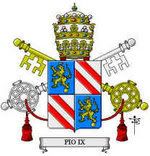The Storm and the Wisdom of Sts. Pius X and Anselm
Sometimes we think the Church is in such a crises that she will surely be lost. But fear not! St. Pius X gives us comfort in an encyclical on St. Anselm (Communium Rerum). The last sentence especially struck me:
"But there is comfort for us: the Lord liveth and "He will make all things work together unto good to them that love God" (Rom. viii. 28). Even from these evils He will bring good, and above all the obstacles devised by human perversity He will make more splendid the triumph of His work and of His Church. Such is the wonderful design of the Divine Wisdom and such "His unsearchable ways" (Ib. xi. 33) in the present order of Providence -- "for my thoughts are not your thoughts, nor my ways your ways, said the Lord" (Isai. Iv. 8) -- that the Church of Christ is destined ever to renew in herself the life of her Divine Founder who suffered so much, and in a manner to "fill up what is wanting of the sufferings of Christ" (Coloss. i. 24). Hence her condition as militant on earth divinely constrains her to live in the midst of contentions, troubles, and difficulties, that thus "through many tribulations she may enter into the kingdom of God" (Act. xiv. 21), and at last be united with the Church triumphant in heaven.
"Anselm's commentary on the passage of St. Matthew: " Jesus constrained His disciples to enter the boat," is directly to the point: "The words in their mystical sense summarize the state of the Church from the coming of Jesus Christ to the end of the world. The ship, then, was buffeted by the waves in the midst of the sea, while Jesus remained on the summit of the mountain; for ever since the Savior ascended to heaven holy Church has been agitated by great tribulations in the world, buffeted by various storms of persecution, harassed by the divers perversities of the wicked, and in many ways assailed by vice. Because the wind was contrary, because the influence of malign spirits is constantly opposed to her to prevent her from reaching the port of salvation, striving to submerge her under the opposing waves of the world, stirring up against her all possible difficulties" (Hom. iii. 22). They err greatly, therefore, who lose faith during the storm, wishing for themselves and the Church a permanent state of perfect tranquillity, universal prosperity, and practical, unanimous and uncontested recognition of her sacred authority."
"But there is comfort for us: the Lord liveth and "He will make all things work together unto good to them that love God" (Rom. viii. 28). Even from these evils He will bring good, and above all the obstacles devised by human perversity He will make more splendid the triumph of His work and of His Church. Such is the wonderful design of the Divine Wisdom and such "His unsearchable ways" (Ib. xi. 33) in the present order of Providence -- "for my thoughts are not your thoughts, nor my ways your ways, said the Lord" (Isai. Iv. 8) -- that the Church of Christ is destined ever to renew in herself the life of her Divine Founder who suffered so much, and in a manner to "fill up what is wanting of the sufferings of Christ" (Coloss. i. 24). Hence her condition as militant on earth divinely constrains her to live in the midst of contentions, troubles, and difficulties, that thus "through many tribulations she may enter into the kingdom of God" (Act. xiv. 21), and at last be united with the Church triumphant in heaven.
"Anselm's commentary on the passage of St. Matthew: " Jesus constrained His disciples to enter the boat," is directly to the point: "The words in their mystical sense summarize the state of the Church from the coming of Jesus Christ to the end of the world. The ship, then, was buffeted by the waves in the midst of the sea, while Jesus remained on the summit of the mountain; for ever since the Savior ascended to heaven holy Church has been agitated by great tribulations in the world, buffeted by various storms of persecution, harassed by the divers perversities of the wicked, and in many ways assailed by vice. Because the wind was contrary, because the influence of malign spirits is constantly opposed to her to prevent her from reaching the port of salvation, striving to submerge her under the opposing waves of the world, stirring up against her all possible difficulties" (Hom. iii. 22). They err greatly, therefore, who lose faith during the storm, wishing for themselves and the Church a permanent state of perfect tranquillity, universal prosperity, and practical, unanimous and uncontested recognition of her sacred authority."

